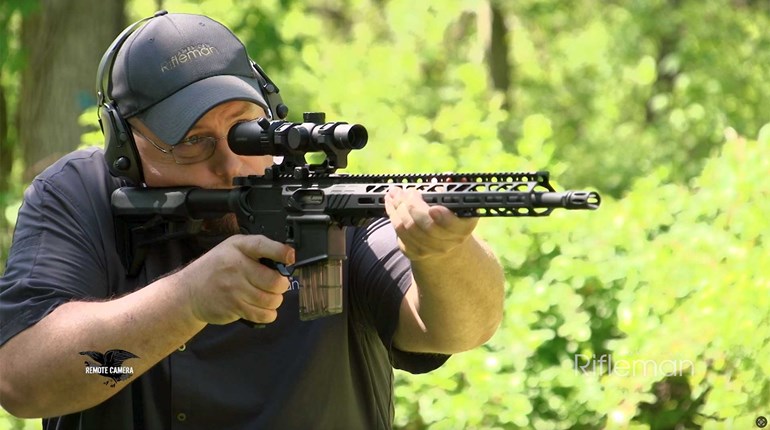
 Fortunately, the deceased was the attacker and the victims were completely unharmed. The successful outcome of what could have been a horrible crime was due to the fact the would-be victims had developed a defensive plan.
Fortunately, the deceased was the attacker and the victims were completely unharmed. The successful outcome of what could have been a horrible crime was due to the fact the would-be victims had developed a defensive plan.
Ross and Annie (not their real names) owned a beauty salon and are hair dressers by trade. Now, you really don't expect a beauty salon to be the target of an armed robbery. Most folks figure liquor and convenience stores—even banks—would be far more likely to get hit. However, Ross and Annie knew any business might be targeted and they knew they needed a plan for dealing with an armed robbery, should one ever occur at their business.
Ross is a very good pistol shot and he concealed his handgun in the back room where he usually attended to clients. Annie and an employee worked in the front room of the salon. Knowing they would be the first ones to be aware of an armed robbery, Ross and Annie decided on a code word Annie could use to alert Ross of potential trouble out front. The code word they chose was "cowboy." They chose it because it would sound like a nickname when Annie began calling to Ross.
The second thing this couple decided was that Annie might have to create some sort of diversion to provide Ross time to get his handgun. They discussed how she could knock over a lamp, or any other object that would make noise. They discussed how she could fake a fainting spell or heart attack to divert an armed robber's concentration. In short, their discussions made Annie realize she had to be able to think on her feet to take the attacker's attention off of Ross long enough for him to arm himself.
On the day of the attempted robbery, Annie and the employee were working in the front room and Ross was with a client in the back. When a man entered the salon, Annie approached and asked how she could help him. He immediately turned on her and pointed a cocked pistol at her face. He also demanded money.
Annie told him that her husband, in the back room, had the money and the robber began to march the two women in that direction. As this was happening, Annie called out, "Cowboy! Hey, Cowboy!" Alerted, Ross was able to step to where his pistol was concealed.
At this point the intruder and the women entered the back room. The robber immediately focused on and pointed his gun at Ross. At the same time, he told the women to get down on the floor. Then, in a loud voice, almost a scream, Annie asked, "What are you going to do to us?" The diversion worked.
For just a moment, the armed robber turned his eyes toward Annie. And, in that split second, Ross got his gun and came up shooting. The armed robber was the only casualty and the only fatality.
From this true story you can see the importance of having a plan. And that plan doesn't have to be very complicated. If it involves keeping a defensive firearm, it is important to get good training and have regular practice sessions. During his preparation, Ross also visualized the moves he would make during an actual robbery. He later reported this visualization helped him carry out his moves without any false starts or hesitation.
At home or work, you and those around you should develop a simple code word to alert others to potential danger. I like that Ross and Annie chose a word that sounded like a normal nickname. Obviously, if you shout out "Hippopotamus," or some other weird word or phrase, the attacker might suspect something is up.
Finally, it is also critical you and those around you discuss ways to create a diversion. The one who has the gun pointed at him can't very well do this, so it is up to anyone else to be alert for the opportunity to divert the attacker's attention. Better still, if both of you are armed, the one not under the gun can create the diversion or go for his firearm.
Whether working with your wife or your business associate, take time to discuss what nature a criminal attack might take, based upon your own situation. Ideally, all parties should be armed and trained in the use of the defensive handgun. Even older children ought to be involved in this process and know where the closest defensive firearm is located. Of course, anyone who plans to handle the guns should have adequate training.
It is also a good idea to discuss the various diversions that can be used around the home or business to get the attacker's attention. Then talk about the various ways your group can take advantage of that diversion. Numerous conversations, even role playing, can give you some idea of the many types of diversions you can create in the home or office.
Don't forget to decide who will call 911 so the police are alerted. Once you've gotten through to 911, never hang up the phone. Even if you have to leave the phone, 911 calls are taped and the recording can become an important piece of evidence and an investigative tool for law enforcement.
You may never be the victim of an armed robbery like Ross and Annie, but defensive plans are critically important and don't necessarily have to do only with criminal attacks. Involve the whole family in making plans. Discuss questions like, "What do we do if we wake up and smell smoke?" "What do we do if we suspect someone is following us home?" And, "What do we do if someone is trying to break down our front door?"
To say you've never had a problem and never will is a simplistic attitude criminals just love. Discuss potential threats, develop code words of alarm and know how everyone will react. Make a plan and be a winner.





































